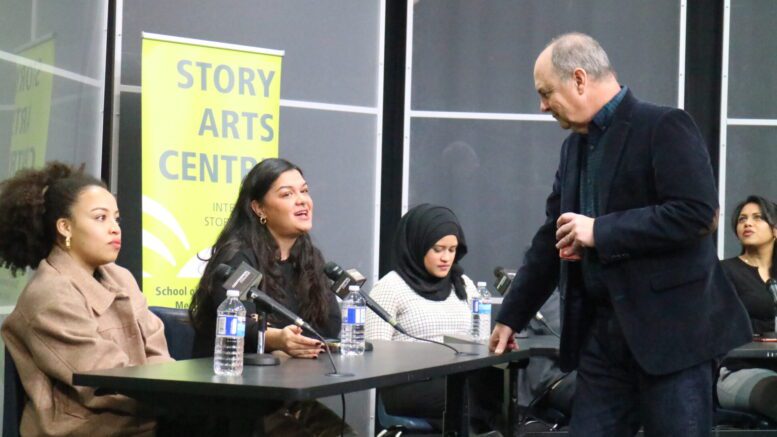Journalists in Canada are harassed online and in person while producing their work, but there are ways to protect yourself, a panel of journalists told Centennial College students on Thursday.
The college hosted a wide-ranging panel discussion about harassment of journalists on March 9 at the request of student journalists. Topics discussed include journalists working alone, their mental health, and how to support other journalists, among others.
The panellists included Angelyn Francis of the Toronto Star, Stacy Lee Kong of Friday Things, Maham Abedi of Global News, Ian Kennedy of the Hockey News, and Amita Singh, a counsellor and Sexual Violence Co-ordinator for Centennial College.
What is harassment?
Harassment can take many forms. It can be verbal or physical. Francis, the Star’s former equity and diversity reporter, said making the distinction between constructive criticism and harassment is important.
When evaluating hurtful posts left on stories, Francis said she asks herself whether the person posting them is “in good faith and genuinely [tries] to improve our journalism.” The comments qualify as harassment if they are personalized towards the journalist, she said.
Ian Kennedy, a writer for The Hockey News and Yahoo Sports, said harassment is “when it goes outside a comment string,” such as when people email a journalist’s boss or communities they are involved with.
Journalists working alone
The panellists stressed the importance of journalists asking for help if they find themselves in uncomfortable situations. Francis said journalists need to ask for training for specific assignments, such as reporting in crowds.
Abedi, network managing editor for Global News, took it one step further. News organizations should provide security for their journalists in unsafe situations. She shared that she was once sent to cover a protest on her own when she was a student.
In the case of student journalists, the panellists agreed that they must have faculty support. Amita Singh, a counsellor at Centennial College, said students feeling unsafe should always speak with faculty members about their concerns, especially if they are feeling unsafe or feel they are being sent to potentially unsafe environments for assignments.
“Everything should be as official as possible,” said Stacy Lee Kong. As a journalist and founder of the media brand Friday Things, she said journalists must let their supervisors know where they are and when.
Knowing background information before engaging in an assignment helps as well. Kennedy said learning from other people who’ve interviewed a source can protect journalists by knowing what to expect. And record everything – it can serve as proof if something goes wrong.
Gender can be a factor
Female journalists routinely face sexism. Francis encouraged them to entertain some interactions for humorous purposes. During interviews, she suggested acting confused over an interviewees attempt to make a sexist joke. Asking for elaboration can diminish the joke’s impact, she said.
A group of female journalists in Canada who have spoken out against online abuse were recognized with the Tara Singh Hayer award on Feb. 15. They include Saba Eitizaz, Erica Ifill, and Rachel Gilmore
Harassment also affects male journalists. Covering a sport like hockey, Kennedy has dealt with people questioning his masculinity. Sports journalists can face harassment when they choose to speak about topics besides game action and final scores, he said.
Mental health and recovery period
It’s important for student journalists to realize they do not need to suffer in silence – asking for help is a must. Abedi doesn’t like the narrative of the journalism industry being for tough people. Journalists prioritizing their safety and mental health is important, but some organizations are still developing the infrastructure to support newsroom employees in these ways.
“There are things you are entitled to that you might not get right away,” said Abedi. Because of this, journalists may need to take time away from the newsroom to recover. Francis said she hopes newsrooms realize “sick days aren’t just sick days anymore.”
Singh said self care in any capacity is good for journalists’ mental health, suggesting they should find “a way to shift the energy … into a space of understanding.”
Wellness checks are a strong way to support other journalists, Francis added. This will help journalists stay connected and encourage others to reciprocate.
Staying away from social media
During the recovery period, journalists should adjust their social media settings to avoid further harassment, or consider taking a break from technology altogether.
“If anyone ever brings up your personal information, it’s never too reactionary to involve law enforcement,” Kennedy said.
Friend groups can also help journalists recover. Francis underscored the importance of having friends who aren’t as knowledgeable about journalism. That can shift conversation onto more positive topics and give journalists other things to think about.
The event was livestreamed. It was co-sponsored by Journalists for Human Rights.

